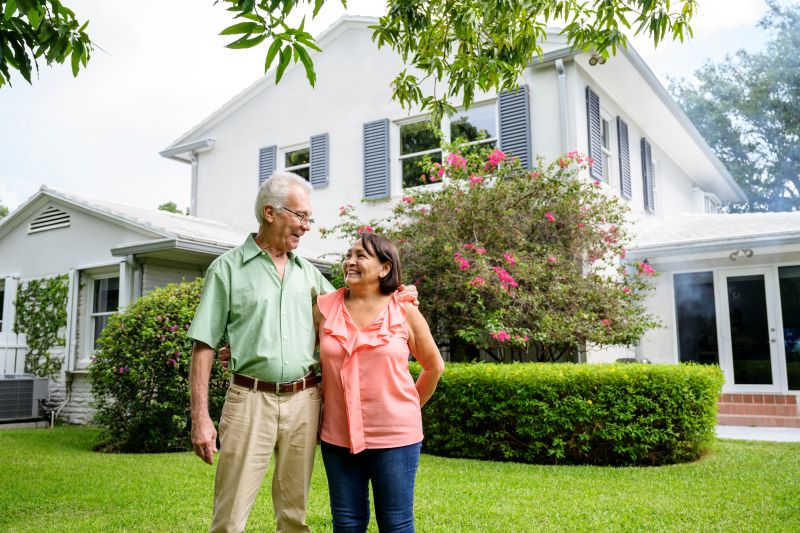To enhance the match between your housing and your lifestyle, you first need to figure out what your ideal lifestyle is. To get started, consider “the three Rs” about the place where you live:
- Your Relationships
- The Region where you’re likely to be most happy
- How well the Resources in a given community suit your particular needs
Relationships
For most of us, family, friends and neighbors are of prime importance in our lives and are often part of the reason we live where we do. If you now live in close proximity to your family and close friends, how happy are you likely to be if you’re far away from them?
- A key issue to think about for many adults is family and grandchildren. If you now live near them and are thinking of moving away, consider how this will affect your ability to see grandchildren’s ball games, concerts and dance recitals, as well as the support you may be providing to your adult children. Moving farther away will likely put an end to family members’ dropping by for a quick visit, or to bring you lunch when you have a terrible cold.
- Do you make friends fairly easily – or do you socialize almost exclusively with people you’ve known since grade school? How important are friends in your life? How critical is it that you have neighbors whom you could ask to watch your home while you’re on vacation or to whom you could turn for help in case of illness or emergency?
Thinking about the important people and relationships in your life may help you decide how close you want to be to family and others you care about, and how far away from them you are willing to be.
Region
A second prime factor that many people think about is where they might want to live, especially if family ties are flexible. Are you excited about the opportunity to move to another part of the country – perhaps to an area where you’ve lived before or to a place you’ve always dreamed of? Or maybe you don’t want to go too far, opting for a spot just a few dozen miles away. Whatever your preference, you’ll want to start by researching the areas where you might like to live, to find the place that will make you happiest.
There is great variety in where people prefer to live. City or country, seaside or mountain, cold weather or warm, seasons that change or not – the choices are almost endless. Some things to think about:
- Do you have a preference for staying close to your roots, to what’s familiar, to where your “history” is?
- Do you love or hate the snow? Or the heat, the wind, the almost-daily rain, or the humidity? Would you miss the ocean or the lakes – the desert or the mountains? Can you picture life in a totally different part of the country?
- Do you want to live in a place where everyone knows your name – or is anonymity your preference?
- Do you prefer a rural area or the big city – or is some place in between your best fit?
Resources
One of the most important aspects of selecting where and how you want to live is finances.
Consider affordability, both now as well as in the long term. Think realistically about the cost of living in an area and with the lifestyle you’re considering. Upon retiring, most people experience a dramatic decline in income. Future expenses, such as taxes and property maintenance, may not be the same as they are now.
Will they remain affordable on your retirement income? Is yours an area where taxes are rising rapidly? You’ll want to factor in taxes, the cost of necessities and any travel you may want to do to visit friends and family who may live in other places.
A single-family home will probably mean that you will arrange and pay for any home services you need, such as lawn mowing and gutter cleaning. A condominium will likely include some services in your monthly fee.
Maybe you would prefer apartment living where the landlord provides all the upkeep.
Whatever housing style you consider, be sure to do an apples-to-apples comparison of the costs involved.
Consider whether you want to live in a place where there is a homeowners’ association that may have rules you’d have to live by, including ones about the exterior appearance of many aspects of your home, such as garden decorations and paint color.
You may want to look closely at several communities to find a place that has the amenities you’re likely to want. As you consider your current community or another place, you’ll want to think about what resources are important to you, now and in the foreseeable future. For example:
- Entertainment: Is easy access to a big city, with myriad entertainment and dining activities, critical? Is having high-quality restaurants nearby important? If you love concerts and the theatre, would there be opportunities for you to attend?
- Religious Opportunities: If religion is an important part of your life, is there a nearby church, synagogue or mosque that you’d want to join?
- Healthcare: Is high-quality healthcare readily available? Are doctors’ offices convenient? Is there access to a good hospital? If you were to need major medical attention, would you be forced to travel an inconvenient distance?
- Educational Opportunities: Would you love to live near a college that welcomes neighbors for courses, lectures and cultural activities?
- Transportation: Do you consider your car a four-wheeled extension of yourself, without which you couldn’t function, or would you love to get rid of the car or leave it garaged most of the time? Are there multiple options for getting around? If you travel frequently, is there a reasonably sized airport conveniently located?
There’s no one right answer to any of these questions, of course. They are intended to encourage you to consider what places might be a good fit for your preferences, your needs and your lifestyle – and to discuss your priorities with the other significant people in your life. In these discussions, you may find that others have different views, and through conversation you all may learn more about each other’s ideas for what places might provide you with your best fit.







Nice list but how do you obtain a realistic evaluation of available healthcare in a specific area?
One way you may consider evaluating a community, including health, is the AARP Livability Index.
Do you offer auto insurance in Hawaii???
Hello, Renee. The Hartford does offer auto insurance in Hawaii. You may get a quote online, or call 888-413-8970 to speak with a rep regarding obtaining a quote.